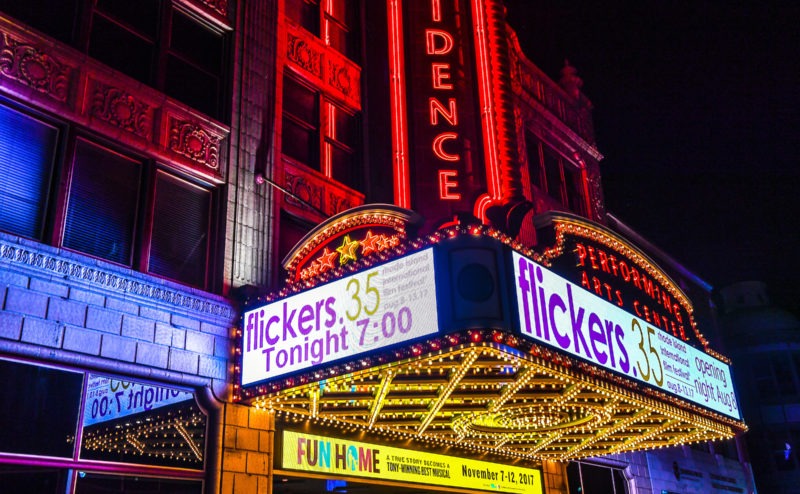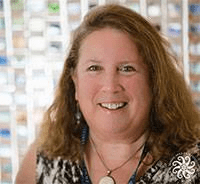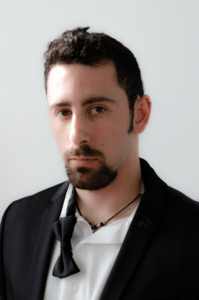
Film Festivals | Filmmaking | Local Industry | Massachusetts | New England | New Hampshire | Reports | Rhode Island
State of The Film Industry
An interview with five leaders of the New England film community about the current state of the industry, how they got started, and what's next.
Written by Devon Kaplan | Posted by: NewEnglandFilm.com
With productions halted, release dates delayed, and movie theaters shuttered, the film industry is facing myriad challenges due to the ongoing Covid-19 pandemic. An artform in which sociality is ingrained—on the sides of both creation and consumption—moviemaking has encountered a formidable obstacle in the public health requirements of social distancing and the interdictions on large public gatherings. In this article, writer Devon Kaplan interviews five key players in the New England film industry who reflect on what it means to be a filmmaker and the current state of the industry in New England.
While the prospects of forthcoming blockbusters remain uncertain, more precarious are the futures of independent films. Film festivals around the world, crucial in bringing small films to audiences and connecting indie filmmakers, are being forced to call off activities for the year or else explore new models of operation.
The New England film industry, a microcosm of the film world at large, is navigating these uncharted waters. And like its global counterparts, it’s finding solutions. New England festivals, like Flickers’ Rhode Island International Film Festival and the Woods Hole Film Festival, have made use of online screenings and drive-in theaters to continue premiering independent films.
In light of this moment’s hurdles and innovations, I sought out local leaders in the film industry to learn about what resilience in this business looks like, past and present. Interviewed here are: Shawn Quirk, Programming Director of Flickers’ Rhode Island International Film Festival; Dan Hannon, founder of the New Hampshire Film Festival; Judy Laster, founder of the Woods Hole Film Festival; Michele Meek, founder of NewEnglandFilm.com; and Steven Feinberg of the Rhode Island State Film Office.
I asked my interviewees to reflect both on their careers and the current state of the industry in New England. They discuss how they got to where they are, what they have learned from working in the film industry, and what shape the industry might take in response to the pandemic. Building on insights gained from challenges of the past, they contemplate a way forward.
Devon Kaplan: What was your mindset when you began working within your field as a film festival director or as somebody in the film industry?

Shawn Quirk, Flickers’ Rhode Island International Film Festival
Shawn Quirk: My mindset [for Flickers] was to invest all my time and effort into building upon RIIFF’s identity as a global event. Nine years later, it has paid off. Our submissions have more than doubled, and with the help of an amazing team, we have worked to further establish RIIFF as a beacon of discovery for independent filmmakers worldwide. Our focus over the years has been devoted to curating the best selection of films possible, programs that reflect a global voice. And from there, things have built upon their own momentum.
Michele Meek: When I started NewEnglandFilm.com over 20 years ago, I was optimistic because I was young and enthusiastic and energetic. But I remember specifically thinking, what if I talk this up to other people and spend all this time and then if totally fails. And I thought, well, so what, at least I tried. But I was an aspiring writer and filmmaker myself who just wanted to know what was going on in the local film industry—to learn, to make connections, to stay informed. So when I didn’t find the resource available to help me do those things, I started it.
Hannon: The idea [for the New Hampshire Film Festival] came when I started working on films. I had some friends that I had met who would also finish some films and were looking for places to screen them. Film festivals were the obvious place to start. But at that time, 20 years ago, there was not a lot of stuff. Even Tribeca was just getting off the ground. There was certainly nothing really around in New Hampshire. So, these guys were looking for places to screen [their films]. The idea was: what if we can screen them all together and have a big thing? And then it was this whole lightbulb of like, “You know what they call that? It’s a film festival.” So that is how it began. After that first year, we got entries from everywhere, and it has been growing ever since.

Steven Feinberg, Rhode Island State Film Office
Steven Feinberg: My goal was to provide professional opportunities for those Rhode Islanders interested in a career in film and television. I would work hard to create an environment where Hollywood productions could come to our Ocean State and give people opportunities to work in a well-paid, professional capacity. As someone who grew up in Rhode Island, there were no film or TV opportunities so I moved to Los Angeles and lived there for twenty-two years. Now, someone from Rhode Island can actually live in Rhode Island and work on a Hollywood feature film or TV series or independent film and make a living. It’s something I am very proud of. It took a lot of sweat, hard work and support of the Rhode Island elected officials. We built a state of film and TV opportunities.
Judy Laster: I had just completed a short film and a good friend of mine was finishing her first feature documentary, so together we started the Woods Hole Film Festival 29 years ago. We showed five shorts films, and the place was packed. The Festival just took off from there. Our idea was to create the East Coast version of Sundance, which at that time was only 10 years old. There were very few film festivals in those days and the whole world of independent film was much smaller, but there has always been an appetite to see good films.
Kaplan: What makes your festivals and the New England film industry unique?
Quirk: RIIFF is Oscar qualifying in categories of short film, short documentary, and short animation. We are BAFTA qualifying for animation and short film. And we qualify for the Canadian screen awards, which is the Canadian Oscars. If you put all of those together, we are one of 10 festivals in the world that have all of those qualifications. That alone draws a lot of people who want to be a part of the festival.
To top it all off, Rhode island’s very unique historically and geographically because it is so close to Quebec and yet so close to New York and Boston. Rhode Island has historical ties to Quebec, and a large portion of our population was French speaking during the early part of the 20th Century. So [among] English speaking festivals, we are probably one of the leading festivals for French-speaking cinema.
We also have the largest Portuguese speaking population in the country within the Providence Metropolitan area, and a substantial Spanish speaking population as well. With vibrant Irish and Italian American communities as well, it is safe to say that Rhode Island is a place where international voices are not only welcome, but in high demand by our local audience.

Dan Hannon, New Hampshire Film Festival
Hannon: One thing [the New Hampshire film festival does] that people see as very unique and make them want to come back every year, is that we make the films and their filmmakers really feel like they own the city—like they are the pulse of the city while they are here.
From when they arrive until they depart, the filmmakers are surrounded by everything ‘New Hampshire Film Festival.’ Everything is just so all-engrossing as far as the identity around the city goes. Banners, all the businesses participating and giving discounts for passholders, all of our parties, our networking get-togethers and coffee-talks, and obviously Q&A’s and movies.
It is what we have all cultivated to bring the city and the festival into one big experience. Sometimes you are in a city for a film festival and you are walking around, and you would never know there is a festival that is actually going on. This is either because of how large the cities are or how spread out the venues are. For us, we are very close knit, making chatting with people and networking much easier, more conducive, and fun.
Feinberg: Rhode Island is 48 miles wide and 40 miles long. We have diverse locations in close proximity. We now have a highly experienced, professional crew base. We have a simple process for our highly competitive Motion Picture Tax Incentive program. We have a cluster of higher learning with our universities and colleges. We have the world-renowned Rhode Island International Film Festival. We have repeat customers as far as film producers are concerned because they are having great experiences here. And our restaurants are awesome. We are also in a corridor between Boston and New York. And our beaches and parks are top notch! Our rush hour traffic lasts five minutes.
Last but not least, we cut through red tape because we have a very hands on film office and our government officials are primarily under one roof and we have access if we need something to happen fast. We also have great public and private sector relationships.
Laster: The community and the people. Woods Hole draws people from everywhere because they come here to do science or to travel to The Vineyard or to vacation on Cape Cod. We have a very smart, engaged and loyal following.
Kaplan: What can you tell me about the economy of the film industry in your specific location?
Quirk: Well, every year there are around 300 films accepted. With roughly three to four people coming to represent each film, we will see on average over 1000 industry guests attending the film festival from outside the region. Over 17,000 tourists attend as well. When hotels, restaurants, and nightlife are considered for guests attending, our overall economic impact for the event is substantial. The festival takes place in August, which is typically the shoulder season for Providence, so the event helps to fill that gap.
Meek: That is a tough one to answer. I think that right now, in general, it is again about what you are in it for. If your goal is to make big-time Hollywood films or mainstream television shows, New England may not be the best place to do that, unless you can do your work virtually. But if you are trying to get independent work done or documentaries, it is a great place to be a big fish in a small pond. There are fewer layers to get to the top in different aspects in the New England film industry. In networking events people are more accessible, actually. I think that is one of the big advantages. It ends up being a little bit more of like a small community where people are more engaged and are at different levels.
Hannon: The excitement of having us continuing annually, and growing each year, is cool. We have been around to see what it does for the community and state. That brings us to what makes the festival super special and unique: it’s the city of Portsmouth. We’ve been there for 17 years. We draw in somewhere north of 10,000 people in four days. The retail and all the service establishments get a lot of traffic. We fill a lot of hotels and a lot of restaurants. So, we definitely have a lot of economic impact on the city during those four days. And all the businesses have taken notice, so they get involved as well. It becomes a marketing tool for production of commercial, narrative, and documentary stories. So, we have seen bumps, thanks to the film festival, in production and production spending.
As for tourism, people fall in love with the area. We take place during the fall on purpose because of the foliage—it is great. We get people outside, and oftentimes they will tack on a day or two besides the film festival to go explore the area’s mountains, seacoast, and whatever have you. That is how we help the region, city, and state.
Feinberg: For every one dollar we give in a tax credit equals eight dollars of economic activity according to Dr. Ed Mazze, distinguished professor of business at the University of Rhode Island. Movies and tv series have a direct impact on the economy via payroll, purchases, rentals, etc., as well as provide opportunities for students and interns. Then when the film or TV show is shared to a worldwide audience, it lives forever and has a positive impact on hospitality and tourism.

Judy Laster, Woods Hole Film Festival
Laster: We have a large economic impact. We are an eight-day event that draws people from all over to the area in the summer to enjoy the Festival. We also do screenings year-round and consistently have full houses and new audiences who travel to the area to attend the screenings. The summer festival draws around 5500 people and we have another 3m000 in the off season.
Kaplan: What challenges do you see facing the film festival landscape and the film industry in the upcoming years, coronavirus-related or otherwise?
Quirk: The challenge right now is the pandemic of course, but by being proactive, this can open the door for opportunities we hadn’t considered until now. I would say the one drawback for any festival over the years is its exclusivity, which also is what makes it so special. The festival has always been somewhat of a sacred thing in cinema. The limit of access is what makes the events around it so precious for those who are able to attend. With that said, now that things are going online, a bit of that personal touch may be lost, but there’s going to be a lot more people who will be able to access these films as well. So this year of virtual festivals may actually be just what we need to further expand our audience for future “in-person” festivals.

Michele Meek, NewEnglandFilm.com
Meek: I am pretty worried about in-person theatres. On one hand, I think that our theatrical distribution system has been extremely problematic for independent filmmakers and grassroot filmmakers because they have been largely excluded from that system. For that reason, I guess I can sort of say, well maybe it’s better if we do not have that gatekeeping system.
On the other hand, of course, I do really have this sentimental attachment to watching film with a group. So, it is devastating to see how hard theaters are being it—especially beloved theaters like the Avon, Brattle, Coolidge that have been such supporters of indie film over the years. And yet I feel like this is a facet of the industry where I would be shocked if it survives unscathed.
It’s been a hard year for filmmakers and film festivals—as it has for so many people. Can you imagine being invited to Tribeca and not being able to go?
But there also have been some interesting inventions and ideas that have come out of it. I spoke with the founder of Stage 32 [a large social network and educational hub for film, television and digital creatives] who had launched a system for filmmakers who had been invited to Tribeca and other festivals to share their films with industry people. So, it was a way of facilitating the kinds of connections that would have happened at a festival but virtually.
I think we are very inventive, and we cannot really know what is going to come out of a challenge like this, but certainly there will be some unexpectedly pleasant and wonderful ideas that emerge and then there will be some pretty tragic losses I would imagine.
Hannon: With what we are going through right now, a lot of people are having a tough time financially. Our entry fees and tickets and passes to take part of the festival are very reasonable and are on the low end as far as the festival spectrum goes. Plus, we have a lot of partnerships, ticket giveaways, sponsorships, and stuff like that. We always have a lot of things going on to help people come.
It might impact people’s ability to make films. But I am always surprised at how people pull off making a film when they are tight on funding. You really do not need much to tell a really great story. That is why our budgets are always all over the place in terms of which films are being submitted. We have bigger budget indies with recognizable stars and all the way down to somebody who might have sold their car to make a movie. Yet it’s so powerful because of what they put on the screen.
But this is a doozy, what we are in right now. We will see how it goes. The show will go on, on our end. We will do what we do to make sure that filmmakers have a voice and have a place to use that voice. We will put people in the seats no matter what, because that is our job. Film festivals are here to help people discover amazing things.
Laster: Aside from the devastation from the coronavirus and the economic collapse, I think the biggest challenge will be engaging younger audiences who are not used to consuming media this way.
Kaplan: If you can qualify by positives and negatives, what are some of the things you’ve learned throughout the years you have worked in the film industry
Quirk: One thing I’ve come to appreciate over the years is the value of the short film: 20 years ago, if you’d ask people how they were going to get in the film industry, many would have said ‘I’m going to make a feature film.’ There was always that myth of maxing out your credit cards, making a feature film and then getting famous, the Kevin Smith idea. While that approach did work for a few, that was a passing thing during the ’90s.
The way to get noticed today, and I think it always has been, is actually to make short films. Shorts are the best way to refine your talent and craft of moviemaking. A feature film is a novel. It’s something you work towards with time. expertise needed for a feature film, but this is something you learn through making shorts. With short films, anyone with right amount of time and effort can create something they are happy with and easily find an audience for it.
Meek: I think that when you are starting out, you are so worried about competition because you have a scarcity mindset; only certain people and businesses can succeed, etc. I just have not found that it really works that way. It is not like somebody did better and I did worse. It is much more complex than that. For example, if you have colleagues who are filmmakers, someone else’s success is not your failure.
So, I think collaboration, instead of always thinking that everything has to be some kind of competition, is really important to how you see your work in the world we live in.
However, one big negative that has not changed enough is the discrimination that exists. It is disconcerting to see how much discrimination leads to women and people of color not getting their work made or getting their work made and not getting the attention and notoriety that they deserve. We are seeing some pushback on this, but I just have not seen enough movement for women. Again, in 2020 for the Oscars, no female directors in best picture or best director categories. How is it possible? Why are we ignoring their work? We have a misunderstanding about the industry being merit based— good work rises to the top—but we forget about all the oppressions that prevent good work from even being made by other minorities. We have minoritized people and their work, and we need to address that in making room for more stories to be told and highlighting those stories as important in film history.
Hannon: The negative is that you get a little jaded because you might be sitting on something great, or you are proud of this piece of work but then you are gonna run into this wall of people doing the same thing. You have to be able to be confident in your ideas and believe in your ideas because you are going to run into the people that do not see it that way. And that is the nature of it. The positive, I would say, is that you will find your comrades in this realm somewhere within this passion/vision/work ethic you have. And you will know it because you will always want to work with them. That is why you always see writers, directors, and actors working together.
Laster: Positive: There are amazing stories being told by highly interesting people and there is a never-ending appetite to see these films, learn about these stories, and meet the filmmakers. Negative: Because it is so difficult to succeed in this world, there is too much pressure on filmmakers to focus on the big festivals that have a big brand, when in reality the regional film festivals have better audiences.
Kaplan: How would you define success in the film industry?
Quirk: It is not a race. It is a life-long competition. But it is not a race. Some people do not make their first feature films until they are 50. You do not have to be young to do this. I know that music is a little more complicated because there is that obsession with youth. But even in music, if you look beyond the classic genres, it does not matter how old you are. It is about being a virtuoso and/or being a talent. It is not about having a catchy tune. It is about refining talent at any age. I believe in that pursuit; I believe it gives meaning in life. I feel like success is not about getting famous either, it is just about making great work.
Meek: To me it is making work that you believe in. I personally realized this when I made my last film Imagine Kolle 37. It made me realize how you are always hoping you are going to find an audience, but if you love it then probably there’s going to be other people that love it also. For me it is not so much about how much money you make or how many fans you have. That kind of success is not something you can hold on to. Rather, it is about putting the stuff out there that you want to see more of in the world and hoping that those good things take over.
Hannon: In a nutshell, it is about being creatively satisfied. I would define it with the three S’s—satisfied sense of self. Are you feeling good about where you are at? With success, do you want to keep it going or grow upon it. Whatever it is, that becomes your drive. I am not talking about contentment; it is being satisfied with where you are right now so that you are confidently looking forward to the future. It is not a monetary thing or ‘I got the new Ferrari,’ it is how you’re feeling about yourself.
Feinberg: Everyone defines success differently. There is artistic success. Financial success. Sometimes they go hand in hand. Sometimes they don’t. Sometimes they find each other later in life. A movie that failed at the box office when released may find financial success twenty years later as it was ahead of its time. It’s a Wonderful Life is a perfect example of that. Citizen Kane as well. Many, many more too. On a personal level, you would hope that a person can meet their own expectations. Someone may want to be a makeup artist and make a living at that. I hope they can live their dream through their work on productions. That’s success. For me, I love seeing people working and being rewarded for their efforts and being proud of what they have contributed. I try to contribute to our success every day.
Note: Interviewee responses have been edited for clarity.

About the Author:
Devon Kaplan is a recent graduate with honors from Roger Williams University. Dev is an aspiring performing artist in areas of dance, music, and acting. Contact him here: devkap28@gmail.com









